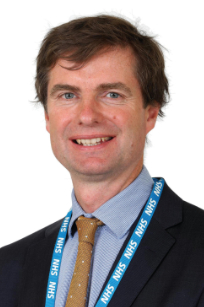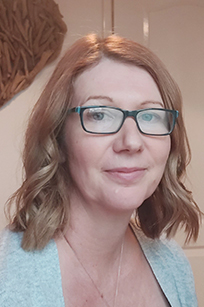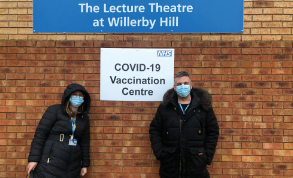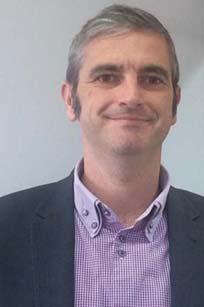In at the sharp end
The NHS-led vaccination drive has been a major success to date, with local programmes started from scratch and centres staffed and opened within a matter of weeks.
This has involved significant partnership working between clinical teams, administrators and logistics, helping the programme to hit its initial targets and continue to push towards the ultimate goal of vaccinating the whole adult population. And you don’t have to look far to find finance staff playing their own crucial part in the roll-out.
Sussex
Mike Jennings, chief financial officer for Sussex Community NHS Foundation Trust, is senior responsible officer (SRO) for the trust’s vaccination centres and on the programme board for the whole of the Sussex vaccination programme.
These centres include a mass vaccination site in the Brighton Centre music venue, plus three further centres in Chichester, Crawley and Eastbourne. The venues operate in parallel with the GP-led vaccination programme, although in a couple of primary care network areas, the trust has partnered with GPs to help them deliver vaccinations to their local populations.
‘I got involved in early November and being SRO is a very operational role – like being a mini chief operating officer for the vaccination service.
But because it is so new, you’re setting up a new service from scratch,’ he says. ‘It is not like taking on a service that already existed or even setting up a service for which a blueprint exists.’
This included creating standard operating procedures and recruiting all the staff. ‘We were clear that we did not want to do this by depleting our core services, which were just starting to recover,’ he says.
This has meant employing hundreds of new staff, supplemented by trust staff putting in extra bank shifts. However, there has been some secondment of back-office staff – providing, for example, digital support across the whole Sussex vaccination programme.
‘We’ve onboarded more than 1,000 staff [third week of February],
with more to go,’ says Mr Jennings. ‘So we’ve effectively built a small trust just to do vaccination using a mix of fixed-term contracts and bank arrangements.’
‘Identifying sites and getting them up and running quickly was a key challenge – often having only a few weeks to kit them out, get the digital done, signing off everything you need for a building,’ he says. ‘But staff has been the big issue. Ensuring we have a fully staffed rota has been a challenge all the way through and is probably still our main issue.’
Being SRO is a very hands-on role with lots of problem-solving requiring immediate solutions – ensuring vaccines are moved around the system quickly, so that supplies are used within a given timescale or facilitating mutual aid between centres to keep rotas filled.
‘As a finance director I’ve been involved in lots of things I wouldn’t normally see – and that’s been great,’ says Mr Jennings (pictured). ‘And there have been really tangible and immediate results, which as a CFO you don’t always get. So although it has been tiring, there is a great sense of positivity and achievement that you take from it.’
He adds that he is grateful to his deputy, Ed Rothery, and his whole team, who have stepped up to enable him to take on the SRO responsibilities. The role is likely to continue until at least the autumn. However, although he says there is no such thing as business-as-usual for the vaccine programme, the executive team is talking about how it can mainstream the work.
‘So while I’ll still keep that SRO role, more of the responsibility I had during start-up will be shared more widely and that will become a smaller part of my day,’ Mr Jennings says.
West Yorkshire
Further north, Alison Needham, head of finance at Greater Huddersfield and North Kirklees Clinical Commissioning Groups, has been at the heart of the area’s vaccination programme.
Asked to nominate a member of her team in December to be the finance lead for the local roll-out of vaccines, she decided to take on the role herself, working alongside SRO Steve Brennan. With a slightly different structure to other areas, the programme has involved close work with primary care networks, the local GP federation, the Locala Community Interest Company that delivers community services and the local acute trust.
To date, there have been two streams of work. There is the community programme, which started in December and now runs out of five local health centres and practices. And this was joined in February by a community vaccination site, running out of Huddersfield Town’s football ground, the John Smith’s Stadium.
‘I’ve negotiated the lease for the stadium, sorted out all the cleaning and security and all the set-up costs – everything around setting up a new site with my colleague, Matt Whittaker,’ says Ms Needham (pictured). ‘I’ve done all the financial modelling, working with the project lead and the SRO, costing up staffing models and working with primary care on a day-to-day basis.
‘Every day has been different,’ she continues, adding that heavy snowfall has added an extra operational difficulty. ‘And as with the whole country, supply of vaccine has been sporadic at times, so you have to be ready to respond to that. I’ve also had to sort lighting units for one of the sites, portable cabins and I’ve spent a lot of time most weekends looking for fridges [for vaccine storage].’
One memorable weekend found her chasing around Leeds trying to source an injectable training arm ahead of a visit to the vaccination centre by prime minister Boris Johnson.
While helping to set the programme up from scratch, Ms Needham has also taken shifts in the primary care operation and at the stadium. ‘It was really rewarding,’ she says. ‘Some of the over-80-year-olds were so thankful to be getting the vaccine and some of them hadn’t really seen anybody for a long time. And at the stadium, I spent six hours pushing wheelchairs in a half-mile round trip to bring people from the car park to the vaccination area – it certainly helped my daily steps total!’
As it started in February, the stadium centre had five vaccination lanes, but the plan is to ramp this up, enabling it eventually to deliver around 20,000 vaccinations per week.
Ms Needham says it is a team effort. While she is the finance lead on her patch, she works with finance colleagues in primary care, Locala, the GP federation and the local trust. ‘It has just been a really joined up approach, with lots of unsung heroes behind the scenes,’ she says.
With the programme set to continue possibly indefinitely, with talk of booster jabs in the autumn to combat new variants of the virus, it is not obvious how long the role will last. ‘Once we get to an equilibrium – we know what we need to do, we know what the costs are and we know what the reporting structure is – my role will diminish,’ she says. ‘But I have to admit, it’s been professionally really enjoyable.’
Humberside
Over towards the east coast, Tracy Mayes says that being asked to lead the Humber, Coast and Vale vaccination programme put her well outside her comfort zone. As deputy chief finance officer at East Riding of Yorkshire Clinical Commissioning Group, she held no fears about the finance and contracting side of the project. But operationalising the programme was a different scale of challenge.
‘I’ve never been a programme director before and if the role had been advertised, I wouldn’t have thought of applying,’ she says. ‘But my accountable officer asked me to get involved.’
With the local programme starting slightly later than other areas, getting things moving fast was imperative.
Ms Mayes (pictured, left) says: ‘Working with senior responsible officer Beverley Geary, we were tasked with starting the vaccination programme for the integrated care system from scratch,’ she adds. It was initially envisaged as a three-day a week role alongside her normal finance role, but it quickly became obvious that it was a full-time job – and then some!
Getting things moving involved setting up a programme office and appointing a management team, all seconded from NHS bodies across the patch, and designing the governance structure.
Eight workstreams were kicked off covering areas such as finance and contracting, workforce and estates. In total, the programme team stretched to 10 people, expanding to 20 as single point of contact arrangements needed to be put in place 24/7 as the programme started running.
The programme soon made up for lost time, mobilising 34 primary care network sites, seven hospital hubs and two large scale vaccination sites, including the primary care-run site at Hull City football stadium.
The North East and Yorkshire region in general set the pace for the country in the vaccination programme and Humber Coast and Vale was a frontrunner in the region.
The region managed to vaccinate 70,000 people on a ‘super Saturday’ towards the end of January, and the Hull City stadium site on its own achieved 4,000 on another day. ‘That is just a primary care practice that has done that, which is phenomenal,’ says Ms Mayes.
Arguably the biggest challenge was being able to respond to guidance that could change multiple times in a single day and to be ready for anything. The team had set out expecting workforce to be the biggest risk. But it wasn’t long before it became clear that vaccine supply was the real unknown – with the service needing to be able to stand teams up or down at short notice depending on deliveries.
However, Ms Mayes says that everyone they worked with was keen to help. ‘You knocked on doors and you were immediately given “yes” as an answer,’ she says, ‘often before you had outlined the question.’
The biggest example of needing to stay nimble was when the team had just set up its system vaccination operation centre.
‘Based on the information we’d been provided by our Ministry of Defence colleague, this was a physical centre,’ she says. ‘We’d sourced a location and we had the computers and the systems set up. We had a TV on the wall and all the maps we needed. We were ready to run that engine room and then the national specification came out and said that’s exactly what you need, but you need to do it virtually.
‘That was a real curve ball, we had to stand down the physical space and rapidly redesign for virtual delivery – going live within 48 hours.’
Ms Mayes recalls two particular highs she has taken from the programme. ‘Working with such a great team – even though it was all mostly virtual – was amazing. The way we worked together was key to the success and the ability to mobilise,’ she says.
But visiting one of the hospital hubs that they had helped to set up was a stand-out memory – seeing everything coming together. ‘It was really overwhelming to see it set up and running and all those people getting their vaccinations.’
Ms Mayes returned to her finance role in February after four months in the programme director role. It has been a tiring experience, working every weekend, and she’s glad to be back. But she is delighted to have played her part in the national vaccination programme and it has been a memorable and developmental experience.
Major challenges lie ahead for the national programme, especially as the country looks to start delivering second doses while continuing the roll-out of first doses, but confidence is high. Success to date has been based on multi-professional collaboration and finance professionals will continue to have a role.
Phone lines
Working in a vaccination call centre gave Bill Bailey (pictured), finance manager at Sunderland Clinical Commissioning Group, a complete change of scenery from his day job. In the six weeks he worked in the CCG call centre – both taking calls and as part of the centre’s management team – he says the work was intense and hugely rewarding.
Keen to get involved, he volunteered to be redeployed along with finance colleague Danial Connah, working six days a week. ‘People were so grateful,’ he says of his first experience on the phones. ‘It was very rewarding, particularly the first few weeks.’ He admits it was a shock to the system doing so much talking – and not about finance – and people’s reaction to being offered a vaccine was overwhelming.
‘Early on, we were talking to some of the most vulnerable people in the city – often in their 90s. I even spoke to someone over 100. Some people were in tears because they saw this as a way of getting back out of their houses and on with their lives.’
The job changed after a few weeks, when the phone number, which was only given out so that people could cancel appointments, started to be more widely known. All of a sudden, the call centre became a two-way operation and Mr Bailey then took on the job of fielding incoming calls.
This led to more challenging discussions if people felt they had missed out on initial vaccination invitations, and then when the government decided to postpone second doses.
Mr Bailey says the role was a huge contrast from his day job. ‘During the day it was extremely tiring – you could sit down in the morning and not move from your desk until lunchtime. But it also gave you an opportunity to switch off more away from work. There were no half complete reports and no deadlines to worry about.’
The team turned in some heroic efforts. For example, the CCG received an additional supply of vaccine one Sunday – and given the time limit on using the Pfizer/BioNTech vaccine, it had to get enough people booked in over the following two days to make use of it. ‘I had a team of 10 people and on this particular Sunday, from 9am to 5pm we booked 1,400 appointments.’
Mr Bailey has now stepped back from the call centre as year-end duties become more pressing and more appointments are being booked via apps.
He is pleased to have been involved and says he has also developed useful contacts and relationships across the system, while also gaining a healthy respect for people working in call centres.
He received thanks on a daily basis from people happy to be getting the vaccine. But Mr Bailey is also keen to thank his finance colleagues. ‘I had a great experience, but it was only possible because of colleagues in the finance team picking up my slack.’
Related content
We are excited to bring you a fun packed Eastern Branch Conference in 2025 over three days.
This event is for those that will benefit from an overview of costing in the NHS or those new to costing and will cover why we cost and the processes.